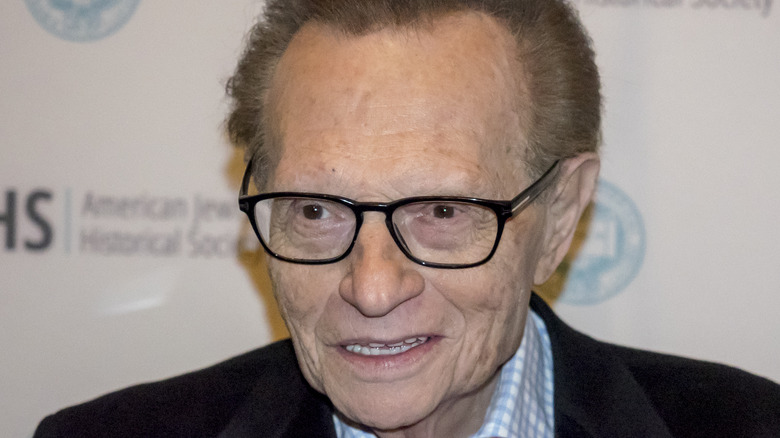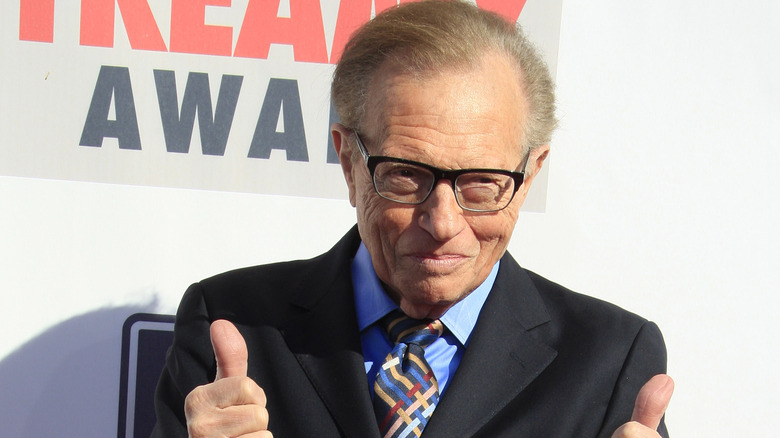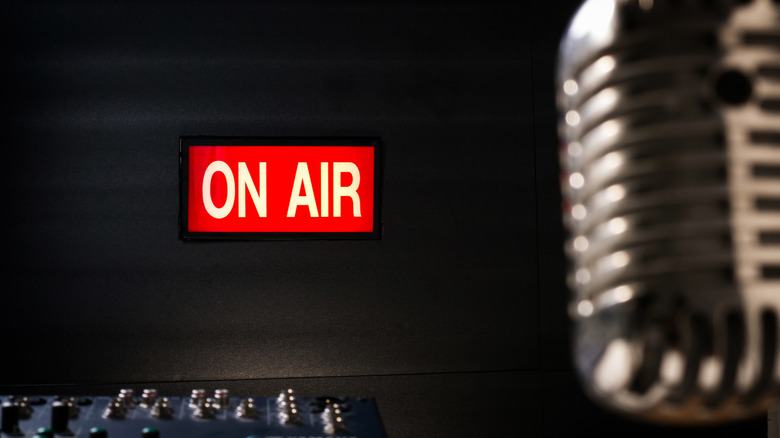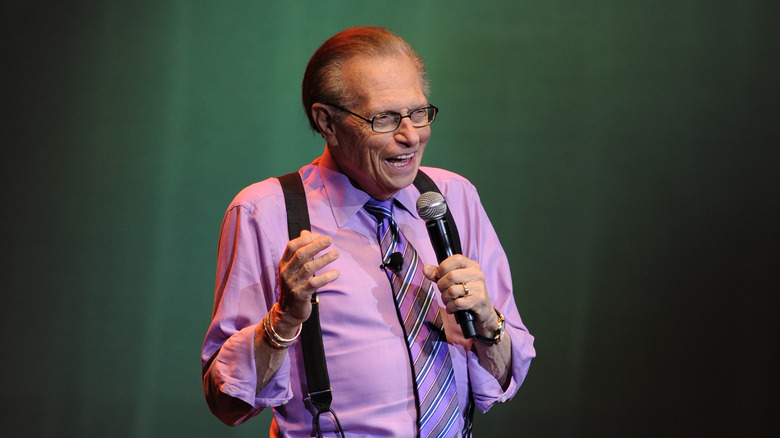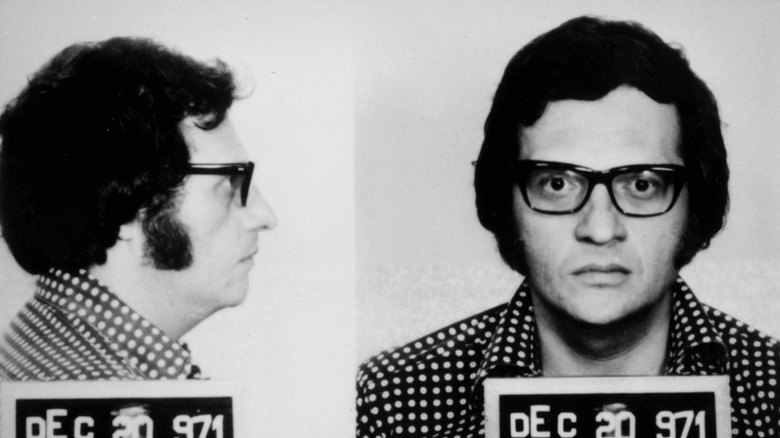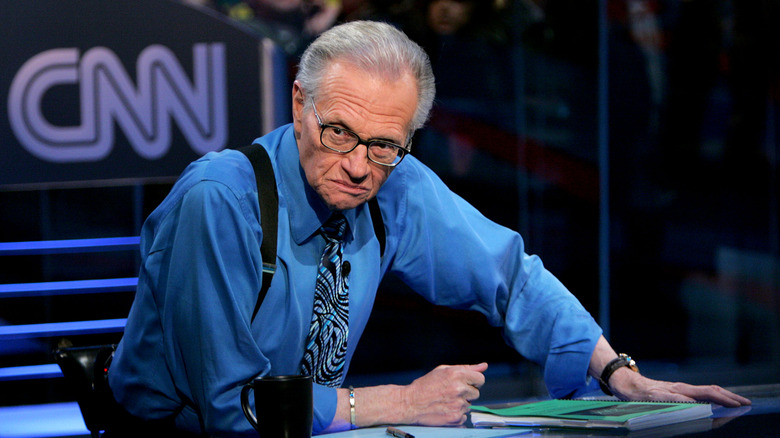Why Larry King Filed For Bankruptcy
Larry King is one of the most legendary figures in broadcast history, but his career — like so many in broadcasting — wasn't always smooth sailing. It spanned decades, starting in the 1950s and lasting up until his death in January 2021.
King was best known for his show "Larry King Live," which ran on CNN from 1985 to 2010 (via Biography). Before landing on cable TV and becoming widely recognized for his trademark glasses and suspenders and his numerous marriages (he was married eight times, two of which were to the same woman), King got his start in Miami. But before he hit the big times, his career was almost completely derailed when he was charged with grand larceny and plunged into debt that caused him to file for bankruptcy. Yet despite these roadblocks, he managed to persevere and become a wildly successful broadcaster. How did he do it?
Early life
Larry King was born on November 19, 1933, in Brooklyn, New York. King's given name was Lawrence Harvey Zeiger, and he was the son of Edward Zeiger and Jennie Gitlitz, both of whom were Jewish immigrants (via Biography). King's father owned a bar while his mother was a garment worker. When King was only 9 years old, his father died of heart disease at age 44. His mother was forced to go on welfare to care for him and his brother, and his father's death caused some emotional instability, which in turn made King lose interest in his studies.
King had dreams of working in radio, but his poor performance in school — he just barely graduated from high school — left him with few paths to reach that goal and limited career prospects. He took a job as a mail clerk to earn money that he then used to help his mother and remained in Brooklyn for several years after high school (via Britannica).
Career in broadcasting
Upon reaching his early 20s, Larry King decided to take a crack at a radio career, so he left Brooklyn and moved down south to Florida. According to Biography, King made this decision after getting some career advice from an announcer for CBS Television. The announcer told King that Miami was a growing market, and for that reason, radio stations were looking to hire a lot of talent, even those with limited experience.
King's first job in radio was with a station called WAHR, which has since changed its call letters to WMBM. King's career started off-air just doing whatever needed to be done around the station, but when one of the on-air announcers quit, he got his chance behind a microphone. This led to his own mid-day shift plus newscasts and sportscasts throughout the rest of the day. Not long after, he took his now-famous last name, "King," having borrowed it from an ad he saw for a liquor store called King's Wholesale Liquor.
King's career gains traction
Larry King started to garner a reputation for himself as a popular on-air talent in the Miami radio scene. Part of his appeal was a conversational interview style — something he was known for throughout his entire career — that he picked up from doing interviews with random people he found around the city.
His exposure wasn't limited to the radio airwaves. In 1960, King made his first television appearance, and he also wrote for various Miami newspapers, both of which served to increase his popularity and presence around town (per Britannica). King was a rising star in the broadcasting world and even met Jackie Gleason, who he would later refer to as a mentor who taught him about the ins and outs of television production (via Biography).
However, despite his undeniable career momentum, in the early '70s, King faced a massive roadblock that looked like it would likely spell the end of his broadcasting career.
Grand larceny charge and bankruptcy
According to the Daily Mail, in the 1960s, Larry King was friends with a man named Louis E. Wolfson. Wolfson was a millionaire by the time he was just 28 years old, but in 1967, he was thrown in behind bars for conspiracy and illegal stock sales. When he was released from prison, Wolfson accused King of stealing $5,000 from him.
The $5,000 came from a total of $25,000 that Wolfson had asked King to give to the New Orleans district attorney, which was likely intended to be a way of gaining some influence over the D.A. or city government. King admitted to using the money to pay off debts but had been paying it back while Wolfson was in prison. That didn't matter to Wolfson, who saw to it that King was arrested for grand larceny. While the charges were eventually dropped, they effectively cost King his broadcasting gigs and left him working as an announcer at a horse track just to get by. King declared bankruptcy in 1978, but fortunately, his career skyrocketed not long after.
Larry King's career gets back on track in a big way
According to Britannica, Larry King was rehired in Miami in 1978 and started hosting a nationally syndicated radio show called "The Larry King Show," which lasted until 1994. The show was successful and caught the attention of Ted Turner, the media tycoon who launched a cable news network called, well, Cable News Network, or CNN (via Biography). King was hired to host his own show on the network called "Larry King Live," which ran from 1985 to 2010 and helped cement him as one of the most popular broadcasters in history. After he left CNN, King started hosting a web series called "Larry King Now," which was vaguely similar to his CNN show and featured long-form interviews with guests.
Larry King died on January 23, 2021, at Cedars-Sinai Medical Center in Los Angeles, aged 87. After his death, a statement released on his Twitter account summed up one of the keys to his long and successful career: "Whether he was interviewing a U.S. president, foreign leader, celebrity, scandal-ridden personage, or an everyman, Larry liked to ask short, direct, and uncomplicated questions, he believed concise questions usually provided the best answers, and he was not wrong in that belief."
